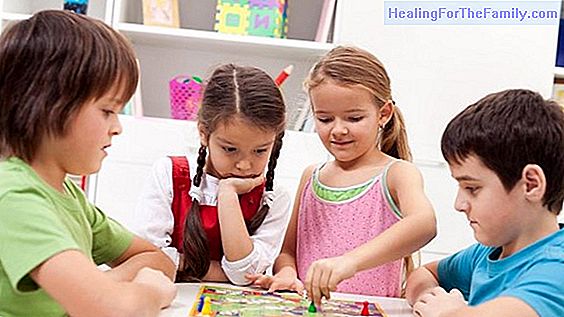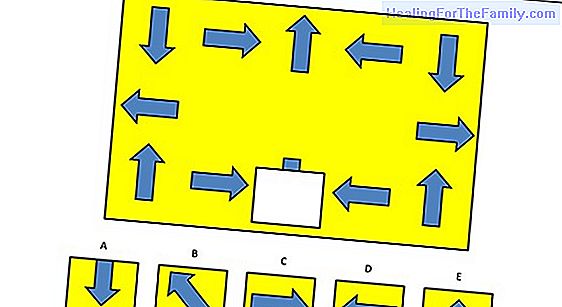The punishment. It is necessary?
It is possible to educate the children without applying punishments. The key lies in establishing what the limits are firmly. The child psychologist, María Luisa Ferrerós is the author of the book Cast ¡Punished! It is necessary? , where he proposes ingenious and effective educational alternatives t
It is possible to educate the children without applying punishments. The key lies in establishing what the limits are firmly. The child psychologist, María Luisa Ferrerós is the author of the book Cast ¡Punished! It is necessary? , where he proposes ingenious and effective educational alternatives to child punishment. His recommendations to educate children are reflected in a series of practical tips, which have led to his method, the Ferrerós method.Educational alternatives to child punishment
What is punishment, what is its function and how should it be applied in the education of children?

Educational punishment is a consequence that comes after an inappropriate attitude of the child. Therefore, educational punishment must be exceptional, coherent, it must be kept firm and constant. You can not be punishing the child for everything because then he becomes saturated and ignores it. When a punishment is placed it must be complied with, and it is important that it is appropriate to what the child has done. Punishments can not be disproportionate, they must be affordable, they must be able to be carried out and maintained. And they must be very coherent: I can not punish my son without tele and I spend the weekend watching TV.
What should we keep in mind when punishing children?
The most important of the punishments is that they are dissuasive, they must cost an effort. The punishment that is now fashionable: the 'I leave you without', has no effect, has very little reaction, because a very important thing is missing so that it is an educational punishment, it does not require any effort. Staying without watching TV, does not involve any effort for the child because he starts reading a story, playing mobile or Play. An educational punishment has to cost the child an effort to help him self-control.
Is it possible to educate children without applying punishment? What is the educational consequence?
Punishment is associated with slap, cheek, camp, dark room ... but all this has evolved and more than punishments, now we talk about educational consequences. We must banish a little what are humiliating or corrective punishments, which are useless. The same thing happens with the cheek. You can not punish a child who hits his friends by hitting him. The children imitate these behaviors.
What attitude should parents have if their children do not obey?
The tone and attitude is very important. If the child for example detects that if he does not want to dine instead of screaming and punishing him, you will not get angry and you will keep dinner in the fridge and give him a yogurt and period will begin to value that those are the rules. Maybe the first day does not dine, if it is rebellious it will do it two or three times as much, never more. When you say dinner, they will all come to dinner. In general, all parents are too aware of children, whether they eat or do not eat, and that is a failure. We have responsibility for the child's food when he is small, but after 5 years of age, the responsibility for the food belongs to the child and when he is hungry he will come to eat.
How can we get children to do their homework and lose their nerve?
Children must invest one hour a day to do their homework, when they are half an hour and, when they are older, an hour and a half. More time is useless because it is not studied. If the child has forgotten to do homework, has not come or has done the trick, we will say: 'I will wake you up at 6 o'clock in the morning for you to do them, that is, or you do them on time, or you I wake up at 6 and you do them before going to school. '
Again it is the attitude, I say it without screaming, without getting nervous, we want to get the child to self-regulate. Firmness and to fulfill it, even if it is a roll for us to get up at 6 o'clock. We will only get up twice, because at the third time they will not do it again.
What should parents do with the 'forgetting' of children?
We have to transfer the responsibility to them, we must make them understand that it is their responsibility. They have to let us know if they need material, we will leave it ready and they must prepare it themselves.
The child has to realize that the responsibility has him and we have to go lengthening the rope. When they are 3 years old, you obviously have to prepare them, but when they are 7 or 8 years old they have to start working them.
The rebellion of children is a problem for many parents. What can we do with a child who takes us the opposite in everything?
I always advise a weekend of parent retreat. You leave the children with the grandparents or your sisters, and you go with your partner to talk about all these things and to set standards in your house. When we have all that well spoken with the couple and we have decided the things that we are going to pass, those that we do not, what we are going to do and what consequences we are going to apply, then we explain to the child that 'until now we have done what we could, with our best intention, but it has not worked. Now we have decided that things are going to change, that we are going to do this, this and this and this, 'and then we start. At first, it costs a little more, it will not be three days, maybe ten, it depends on how rebellious the child is, but if you are clear about what you have decided and are very metallic, that change of attitude will work.
Marisol Nuevo.












